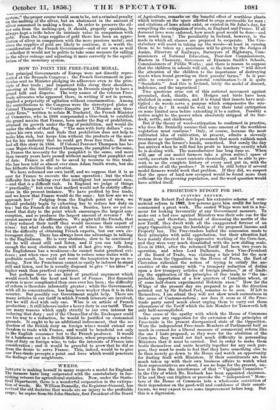HOW TO POINT THE FREE-TRADE MORAL.
principal Governments of Europe were not directly .repre- sented. at the Brussels Congress ; the French Government in par- ticular sent no Minister pledging its adherence even to the prin- ciple of free trade ; and impatient folks shrug their shoulders, sneering at the futility of meetings in Brussels simply to have a grand talk and disperse. The very names of the veteran Free- trade advocates who appeared there, in writing if not in person, implied a perpetuity of agitation without consummation. Among the contributions to the Congress were the stereotyped plates of Colonel Thompson's " Contre-Enquete par L'Homme aux Qua- ratite Ecus," written to refute M. Duchatel, the French Minister of Commerce, who in 1834 compounded a blue-book to establish the grand maxim that France, born under the flag of prohibition, attained its growth under the flag of prohibition, and would die under the shade of that flag. " The man.with forty dollars " exa- mines his own state, and finds that prohibition does not help to make him rich, but keeps him without the products or the mar- ket for his industry that he could get from free trade. But we had all this story in 1834. If Colonel Perronet Thompson has be- come Major-General Perronet Thompson, the pamphlet is the same, in France the necessity for the pamphlet is the same, and more than twenty years have passed without making that pamphlet out of date. France is still to be saved by recourse to free trade. She has been told so almost ever since Adam Smith wrote, but she has hithertbileclined the salvation.
We have reformed our own tariff, and we suppose that it is as easy for Franco to execute the same operation ; . but the whole difficulty lies in talking over that intelligent but mercurial race, —and that is a difficult task. In England we judge of things " practically," but even that method would not be strictly effica- cious in the present instance. We have profited by free trade, and we know that France would do the same ; but how are we to approach her? Judging from the English point of view, we should probably begin by exhorting her to reduce her duty on tea : but the French do not drink tea. Besides, have we yet re- duced that duty to the point which encourages the largest con- sumption, and so produces the largest amount of revenue ? We • cannot answer in the affirmative. We might tell the French, that if they reduced their tariff they would increase their export of wines : but what checks the export of wines to this country ? Not the difficulty of obtaining French exports, but our own ex- travagant duty. There has always been one advantage in talking to the Englishman. He is very obstinate, slow to be •convinced ; but he will stand still and listen, and if you can talk long enough the moss obstinate man will at last give way. Besides, the Englishman has a weakness—he cannot resist practical evi- dence ; and when once you get him to reduce some duties with a profitable result, he could not resist the temptation to go on re- ducing. Now the Frenchman cannot so easily be induced to stand still and listen, and he is usually disposed to give " lea idees " a higher rank than practical experience. But perhaps there is one kind of practical argument which would reach both the head and heart of France. Her financial system is more complicated than ours ever has been ; the difficulty of reform is therefore inherently greater ; while the Government, with all its concentration, has long been weaker than it is in this country. But possibly our Government might help. There are many articles in our tariff in which French interests are involved, but Ave will deal with only one. Wine is an article of French production ; it still labours under a heavy duty in our tariff. There are many reasons which apply strictly to our own interest for reducing that duty ; and if the Chancellor of the Exchequer could see his way to a reduction, he would be justified on economical grounds. It ought to be an additional inducement, that the re- duction of the British duty on foreign wines would extend our freedom to trade with France, and would be beneficial not only- to the English consumer but to the French producer. It would be a handsome act in a British Minister, when proposing a reduc- tion of duty on foreign wine, to take the interests of France into consideration ; and it would be graceful to avow that he did so from the desire to serve France. This, indeed, would be to give our Free-trade precepts a point and force which would penetrate the feelings of our neighbours.


























 Previous page
Previous page